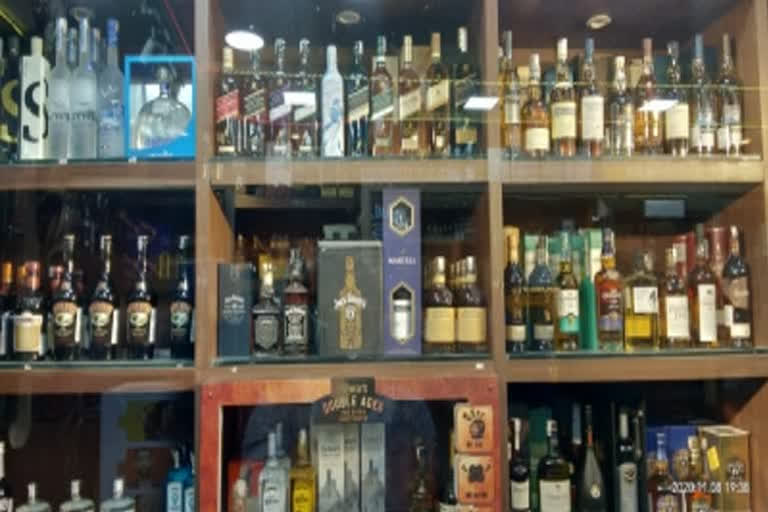Patna: Once Chief Justice of India NV Ramana had cited the prohibition law in Bihar as an example of "lack of foresight", which virtually leads to choking the courts with cases. The death of 11 persons in a hooch tragedy in the Saran district of Bihar and 25 losing eyesight has once again raised serious questions on the existence of prohibition law in the state.
This is not the first time people have died after consuming illicit liquor in Bihar. According to the State government data, 173 people died in the last year due to the consumption of spurious liquor. The latest incident took place in Chhapra where 11 people died. The kin of the deceased said that liquor was available at a cheaper price due to which the villagers rushed to drink, following which the next morning their condition became critical, leading to deaths. In January 2022, 36 people died in back-to-back incidents in the Buxar, Saran and Nalanda districts in the state.
The government, meanwhile, has displayed their own set of logic claiming that hooch tragedies are also happening in those states where prohibition is not implemented. ETV Bharat spoke to a cross-section of people in order to understand the reason behind the recurrent deaths albeit prohibition law. Patna-based political analyst Dr Sanjay Kumar opined that though the state made the law, but implemented it without social awareness, it has resulted in hooch tragedies.
"No social awareness was created before its implementation and officials, who are deputed to enforce the law, are not performing their duties with honesty. A parallel economy has been established in Bihar and there is a strong nexus between the liquor mafia, police and excise department. Just in the name of social change, you cannot implement anything without looking at its repercussions. First and foremost, how is liquor entering Bihar? It means that bordering areas are not sealed and there is no check and balance over there," Dr Kumar said.
Also read: Spurious liquor claims 11 lives in Bihar's Saran district
"The State government is using drones, helicopters and quick mobile service to check the transportation of liquor. Despite all that, liquor is available and home delivery is taking place. It means that police personnel and excise department officials are allowing liquor into the state. These people catch one truck for the show-off and allow nine trucks" he pointed out.
"The police personnel and excise department officials only catch small fish for the record and don't touch the big one because they get away after giving bribes. The entire system involved in implementing the law has become part of liquor sales. If the system does not change, the prohibition would never be implemented successfully in the state and will remain a failed law" he said.
The shoddy implementation can be understood through a report by the National Family Health Survey, which noted Bihar consumed more alcohol per capita than Maharashtra. Bootlegging and home delivery of liquor, among others, have come up in recent times as ways to bypass prohibition in the state. Dr Vidyarthi Vikas, Assistant Professor at AN Sinha Institute of Social Studies, said that the intention of the government is good, but it is the police not implementing the law. "I don't doubt the intention and policy of the government. It has brought a partial change in society and domestic violence has gone down" he said.
Also read: Over 73,000 arrested for liquor-related crimes in dry Bihar in 2022
"For example, if 100 people were drinking earlier, the number has now come down to 40. However, the prohibition has become the money minting machine for the police. Earlier, when people used to break any law, they used to get away by giving minimal fines of Rs 100 and Rs 200, but in prohibition, one has to pay heavy money. Police are misusing the law to make money due to which prohibition is not fully implemented in Bihar," Vidyarthi asserted.
He further said, "The youths are badly being affected and they have jumped into the bootlegging and supplying contraband. The State government needs to stress upon this front as it is the matter of youths' future." Disproportionate amount of energy, resources and time has been enforced to make prohibition successful, but the result is zero ever since it was implemented in 2016.
Dr Bakshi Amit Kumar Sinha, who is a faculty at the Centre for Economic Policy and Public Finance (CEPPF) at the Asian Development Research Institute (ADRI), Patna, stated that due to prohibition there is distortion in the economy. "The prime objective of the prohibition is a social benefit and the benefit should directly reach the people. The illegal money, which is being generated from the bootlegging and smuggling of liquor creates distortion in the economy. It does not float in the market legally due to which the money is mainly used in informal sectors. It also hampers the tax collection," Bakshi stressed.
Last time when hooch tragedy had taken place in Bihar, the wife of one man, who died in hooch tragedy, had said, “Daarubaz ki biwi hona pasand hai, na ki vidhwa hona (I like being a drunkard's wife rather than becoming a widow). While the illicit liquor problem has been struck with prohibition, it is far from over. The responsibility now is in the hands of Chief Minister Nitish Kumar, who pioneered the liquor ban.


